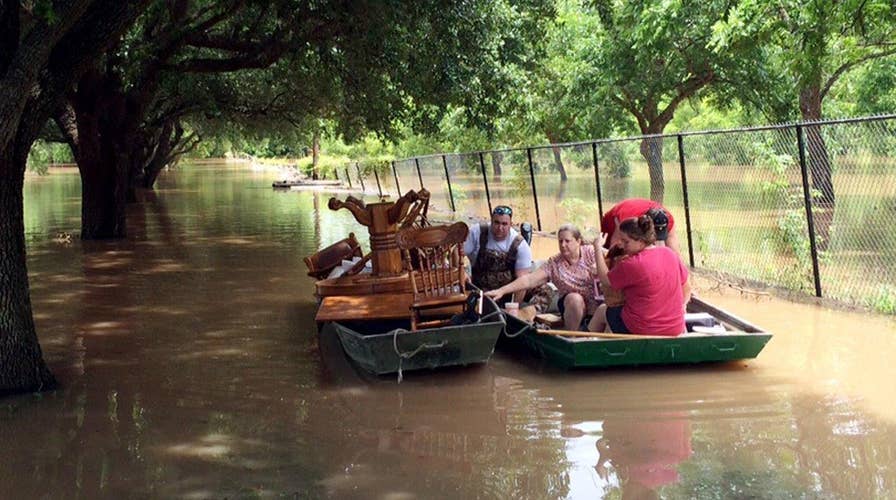Texas residents frightened amid flooding, more rain coming
Casey Stegall reports from Richmond
The National Weather Service placed most of Central Texas under a flood advisory as flooding concerns grow as storms roll throughout the area, Fox7Austin.com reported.
News of the latest flooding threat came a day after Texas Gov. Greg Abbott declared a state of disaster Wednesday in 31 flood-affected counties including Lubbock County in West Texas, Hidalgo County in the Lower Rio Grande Valley of South Texas, and Jasper County in East Texas.
At least six people died in floods last week in Central and Southeast Texas.
The storms have prompted flooding in parts of Texas that two years ago had run dry because of drought conditions. They are the latest in a string of torrential rains since May 2015 that have put swaths of the state underwater.
Southeast Texas has been hit particularly hard and often, including storms in March that dumped up to a foot of rain in some areas and brought record flooding not seen since 1884 along the Sabine River. In April, more than a foot of rain fell in parts of Houston, submerging scores of subdivisions and several major highways, forcing the closure of schools and knocking out power to thousands of residents who were urged to shelter in place.
State Climatologist John Nielsen-Gammon said the average annual rainfall in Texas over the last century has increased about 5 to 10 percent. But the severe weather over the last year was exacerbated by El Nino, which is the natural warming of parts of the Pacific Ocean that changes weather worldwide.
The El Nino period is dissipating but Nielsen-Gammon said the frequency of heavy rains likely will continue.
Elevated water levels could continue through the weekend as forecasts call for more rain. The National Weather Service has issued a flash flood watch for the greater Houston region where 8 to 10 inches could fall through Friday in some isolated locations. The Austin area is expected to receive 3 to 6 inches through Friday, while Dallas and North Texas is forecast to receive 3 to 5 inches by the end of Thursday.
Fort Bend County's emergency management coordinator, Jeff Braun, said his biggest concern is the additional heavy rainfall in the forecast, which could delay evacuated residents from returning to their homes for up to a week because the water in flooded areas "will not have anywhere to go" with more rain.
Barbara Leach, who lives in Rosenberg in Fort Bend County, said she's not going anywhere. The Brazos flooded the mobile home where she and her husband have lived for 41 years, but Leach, 78, said she enjoys their proximity to nature too much to leave.
Leach, her husband Dan, and their family spent Wednesday ferrying furniture and other belongings from their mobile home to dry land on two boats.
Leach said while government officials could have done some things to help mitigate flooding problems, nothing could have really stopped it.
"This is Mother Nature and I don't think they could have prepared for this. I don't care how many dams or dikes or whatever they have," she said. "I'm not blaming anybody for it. That's life. That's the way the world is. People have been hit harder than we have. So we'll come out OK."
The Associated Press contributed to this report


